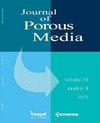Pore-Scale Studies of the Effective Gas Diffusivity in Microscale Porous Media: Model Development and Influencing Factors
IF 2.3
4区 工程技术
Q2 ENGINEERING, MECHANICAL
引用次数: 0
Abstract
The diffusion of gases in microscale porous media is a phenomenon of great importance in various engineering applications. Accurate prediction of gas diffusivity in these media is crucial for optimizing such processes. In this study, we conducted numerical studies using the Direct Monte Carlo simulation method (DSMC) to investigate the gas diffusion process in microscale porous media, in which the porous media was reconstructed by the quartet structure generation set (QGSG) method. We examined the influence of gas pressure, porosity, tortuosity, and porous microstructure on the effective gas diffusivity in microscale porous media. The results show that the dimensionless effective gas diffusivity is negatively correlated with the gas pressure, considering the same the same microstructure. The tortuosity, which depends on the microstructure, significantly influences the value of gas diffusivity. Specifically, as the tortuosity increases, the effective gas diffusivity decreases at the same porosity. In addition, the anisotropy has a substantial effect on the gas gas diffusivity in a certain direction; however, it has almost no influence on the effective gas diffusivity. Finally, based on a large number of numerical results, we proposed a predictive model for effective gas diffusivity in microscale porous media. This model takes into account the the effects of Kn and tortuosity and is able to predict the gas diffusivity within isotropic and anisotropic porous accurately.微尺度多孔介质中有效气体扩散系数的孔隙尺度研究:模型开发及其影响因素
气体在微尺度多孔介质中的扩散是各种工程应用中非常重要的现象。准确预测这些介质中的气体扩散率对于优化此类过程至关重要。本研究采用直接蒙特卡罗模拟方法(Direct Monte Carlo simulation method, DSMC)对微尺度多孔介质中的气体扩散过程进行了数值研究,并采用四重奏结构生成集(QGSG)方法对多孔介质进行了重构。研究了气体压力、孔隙度、弯曲度和孔隙微观结构对微尺度多孔介质中有效气体扩散率的影响。结果表明:在相同微观结构条件下,无量纲有效气体扩散系数与气体压力呈负相关;弯曲度对气体扩散系数有显著影响,而弯曲度与微观结构有关。在相同孔隙度下,随着弯曲度的增大,有效气体扩散系数减小。此外,各向异性在一定方向上对气体扩散系数有实质性影响;然而,它对有效气体扩散率几乎没有影响。最后,在大量数值结果的基础上,提出了微尺度多孔介质中有效气体扩散系数的预测模型。该模型考虑了Kn和挠度的影响,能够较准确地预测各向同性和各向异性孔隙内的气体扩散系数。
本文章由计算机程序翻译,如有差异,请以英文原文为准。
求助全文
约1分钟内获得全文
求助全文
来源期刊

Journal of Porous Media
工程技术-工程:机械
CiteScore
3.50
自引率
8.70%
发文量
89
审稿时长
12.5 months
期刊介绍:
The Journal of Porous Media publishes original full-length research articles (and technical notes) in a wide variety of areas related to porous media studies, such as mathematical modeling, numerical and experimental techniques, industrial and environmental heat and mass transfer, conduction, convection, radiation, particle transport and capillary effects, reactive flows, deformable porous media, biomedical applications, and mechanics of the porous substrate. Emphasis will be given to manuscripts that present novel findings pertinent to these areas. The journal will also consider publication of state-of-the-art reviews. Manuscripts applying known methods to previously solved problems or providing results in the absence of scientific motivation or application will not be accepted. Submitted articles should contribute to the understanding of specific scientific problems or to solution techniques that are useful in applications. Papers that link theory with computational practice to provide insight into the processes are welcome.
 求助内容:
求助内容: 应助结果提醒方式:
应助结果提醒方式:


